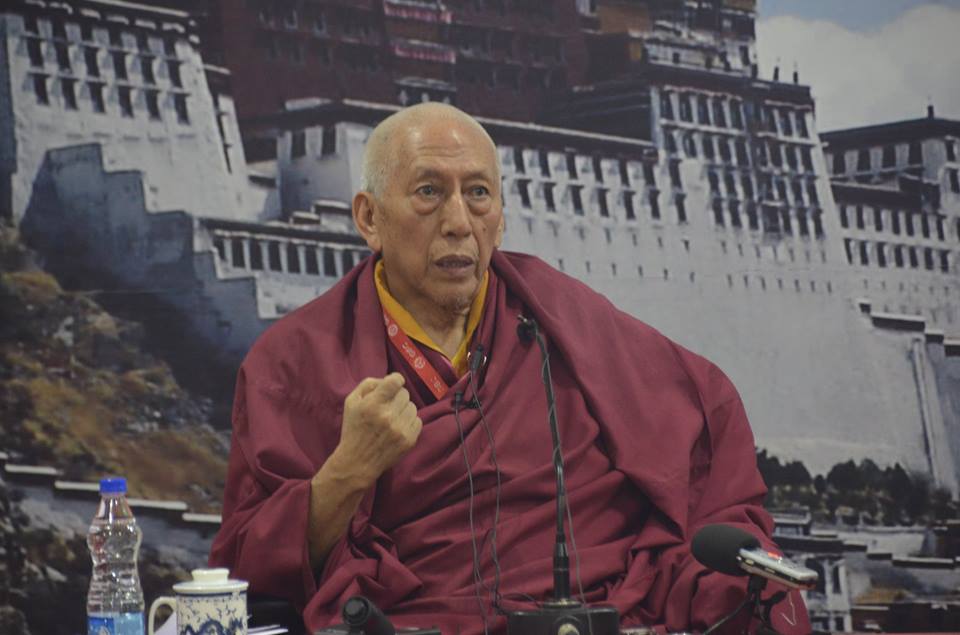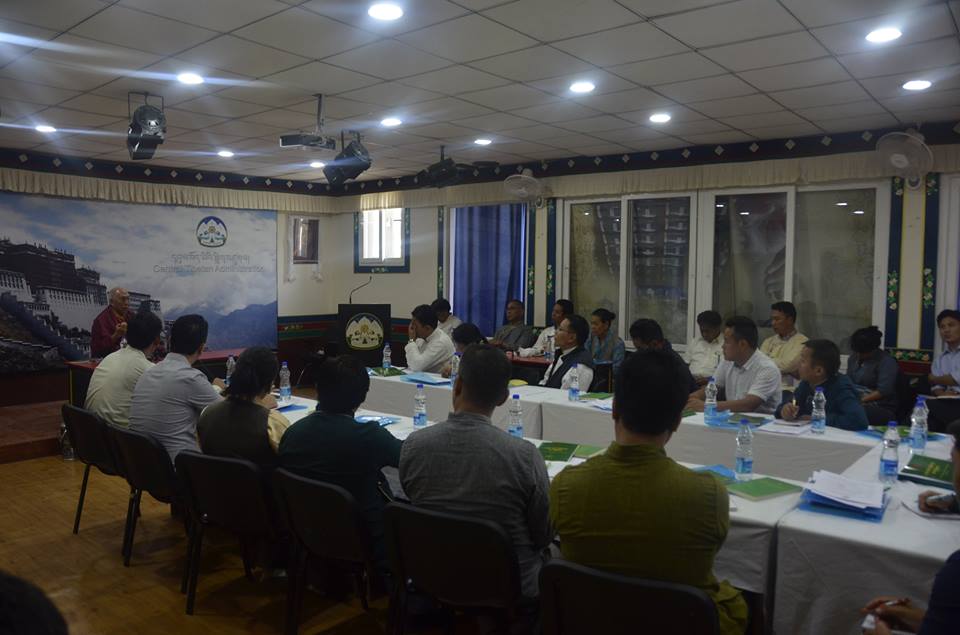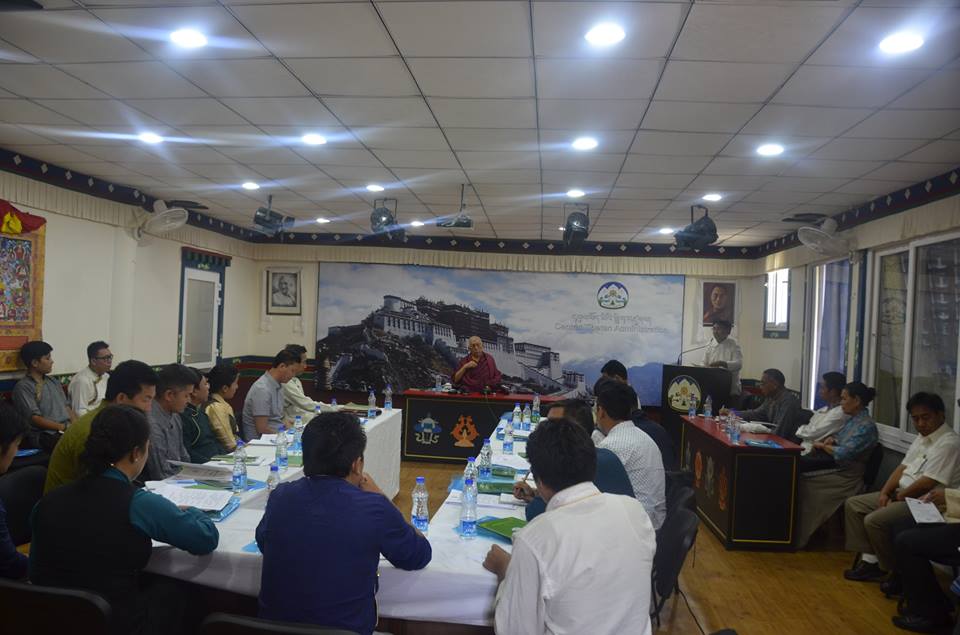Guidance at Intensive Training on Education Policy
In the morning of 24 May 2017 His Eminence Prof. Samdhong Rinpoche gave a guidance talk on the theme of “Guidance on implementing the Education Policy in general,” at the three-days intensive training for Education Officers and Counsellors, organised by Education Department, Central Tibetan Administration, in the hall of Department of Information and International Affairs, Dharamshala. At the start, Mr. Tsering Samdup (Head of Education Council) gave an introductory speech.
Thereafter, His Eminence Prof. Samdhong Rinpoche gave the guidance talk, giving the insights that: If Tibetans as a race are to exist as a distinct race, and the racial identity is to be well-represented, the language—the spoken and the written, which are the foundations of all its knowledge-heritage and culture—must be protected from all directions; in particular, of many things which make our Tibetan identity, our language is an indisputable and greatly important feature of our identity; the spoken language is a natural thing, while the written language is devised with dependence on the spoken one, and the flow of written-norms (grammar, etc.) are as well devised with dependence on the ways of communicating in the natural spoken language; as such, one needs to know clearly that the language that is there naturally the time one is born is an identity feature of that race.
His Eminence Rinpoche continued: For a race to be distinct, the most important thing is to ensure that when one thinks the conceptual thoughts arise so in one’s own language; then to utter in the language is like the second step; mainly, if one’s thought latency is able to remain in one’s language, than such a person’s all three—body, speech and mind—would become of that race; for example, the body is naturally of Tibetan race, the mind which resides in that body thinks in Tibetan language, thereby the language which accompanies the conceptual thoughts when thinking, is Tibetan language—even though the person could learn many other languages; for instance, when thinking of bum-pa, initially if the thought arises in the Tibetan language as bum-pa, and subsequently it is translated [in one’s thought] in English as pot, then that person is a genuine Tibetan; but, if the initial conceptual thought arises in English as pot, then that is not right, such a person has become what is proverbially called as “ra-ma-lug,” neither goat nor sheep, the person’s body, speech and mind have not remained in the natural state, rather they have become in the entity of fake, made-up, and if something is fake, it’s worth cannot be compared with the genuine; as such, it is so important to plant imprints (build latencies) on one’s language and then to learn it.
Continuing further, His Eminence Rinpoche said: These days many people talk of “race.” From the time when we had just arrived in India it was already a thoroughly familiar utterance that the Tibetan children are the future seeds of the Tibetan race; therefore, the seed has to be kept pure; if the seed is chemically/genetically modified, the new crop what grows from that would be one that is chemically modified—at any rate, a crop that grows, on which changes have been made, not something that is pure. If Tibetans as a race is to exist as a distinct race, and the racial identity is to be well-represented, the language—the spoken and the written, which are the foundations of all its knowledge-heritage and culture—must be protected from all directions; to protect from all directions, it is important to do so from young age; what type of a syllabus of subjects be set, how the classes should be run, how the examinations should be held, and so forth, are like branch details; the main thing that is important is our Perception/Viewpoint; if the English “perception” is translated as mṅon-sum, it is too narrow a rendering; it is important that we adhere to a viewpoint as regards overall thing, and that the viewpoint has become set in our nature (habit), and it goes without saying that there would be many external influences on that; as such, although there are many important things, yet three things that are greatly important are: viewpoint as regards the objectives of education, viewpoint as regards the methods of education, and viewpoint as regards students.
If the objectives of education are to be summarised, His Eminence Rinpoche continued, there are two aspects: modern and traditional; the modern viewpoint is to see whether or not one is able to become financial, subsequent to one’s studies, to become a servant and see how much salary one could earn; and the ability to earn optimum salary is equated with the highest level of education; therefore, the two viewpoints as regards the objectives are so different: one where one studies for earning a livelihood, whereas in the other (the traditional) the objective is to remove ignorance and thereby make the person learned and with intellect insights. There are many changes taking place in the West; in our host nation India the viewpoint as regards education is very much that of to become servants, it could not be helped, because when Macaulay’s education policy was being formulated it was already decided that there had to be created a new class of Indians who would be, except for their skin colour, wholly English, in thinking, in manners of talking, in attitude, and so forth; I am not saying this without basis, there was a resolution passed on the policy. Macaulay was someone of whom there was a news of him nearly setting on to head to Tibet bringing along ten elephants. He was the initiator who laid the foundation for establishing a system of English-medium education in India; he has said that if given education in such a way there would be no need for the British to come to India to rule, rather by giving the Indians a good salary, the wants of the British government and of the British Crown would be achieved fully. As such, that viewpoint is verily that of servile thinking. Seventy years have passed since India gained independence, yet still independence of language and thinking have not been gained, it would not be wrong to consider that the British rule still remains in India.
His Eminence Rinpoche continued: When the Institute of Higher Tibetan Studies (later Central University of Tibetan Studies) at Sarnath, Varanasi, was being established, the first question the Indian Government officials asked of the Institute was, “What is employment perspective?” At that time I responded to them that we were giving education at the Institute to make the students become masters, not to become servants.
Continuing on, His Eminence Rinpoche told the eminent gathering: In our exile society, in our society of teachers and parents, and in our society of the administration, we need to totally give up the viewpoint that the objective of education is that education is a means for livelihood in life. Means of livelihood is a matter that is achieved along by; the primordial (prehistoric) people did not know the written language, yet they did not die of starvation; even with dogs and animals, those that die of starvation are very few; an Indian proverb says, “There is nothing [difficult] about this one mouth to be sustained by the two hands.” Since in anything spiritual or mundane, insight/wisdom is paramount, giving education is for enhancing insight; as such, it is important to not make mistakes as regards with this viewpoint towards education. The most important thing is to adhere to the ultimate objective from the viewpoint of philosophical principles. The objective of education is to make know what was not known, not for livelihood. The method of education should not be mainly as gathering and imparting information, rather for the students themselves to analyse the information and then to know. Students must not be viewed as commodities to be sold at market, rather certainly regarded as human beings. The difference between knowing and assumption needs to be distinguished, assuming is not knowing; for knowing, it is to be achieved through learning, reflection and meditative familiarisation, and by applying the four reasonings.
His Eminence Rinpoche continued further: The viewpoint as regards education must not be through reward & punishment, comparison and competition. The viewpoint as regards teachers must not be teacher as somebody who has all the powers or somebody who gives orders to students, rather it has to be as friends in cooperation at analysis; the duties of a teacher are these three: 1. To remove fears in students, and to make the students enthusiastic at their studies; 2. To impart clearly the subjects being taught; and 3. To assist in making clear the doubts not resolved. Likewise, of the ten qualifying criteria for a teacher, there has to be a feeling of closeness of compassionate thought between teacher and student, and to strive towards a good educating through cooperation.
In continuation, His Eminence Rinpoche reminded: For the Education Policy to be implemented, it is very important there has to be perfectly the viewpoints mentioned earlier. Next, teachers and parents need to be acquainted with each other, and there also has to be no conflicts between administration and teachers, rather certainly a close feeling. In brief, if the Education Policy is to be implemented perfectly, at first, the administration and the teachers need to understand well the Education Policy, and through having understood it, to believe in it; it would be not right if there is no thought appreciating the Policy, and that it certainly needs to be implemented; it would be difficult to implement something in which one does not believe.
At the end His Eminence Rinpoche answered questions. Those attending the guidance talk comprised of Mr. Ngodup Tsering (Minister for Education), Karma Senge (Secretary, Department of Education), Tsering Samdup (Head of Education Council), Mr. Karma Chungdak (Director, Tibetan Homes Foundation, Mussoorie), Head of Education and counsellors from Tibetan Children’s Village Schools, Sambhota, Gangchen Foundation (Nepal), Textbooks editors from Department of Education, and staff members from various departments.

